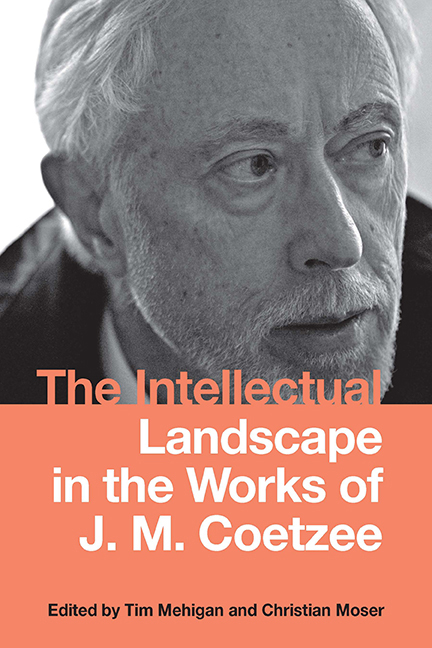Book contents
- Frontmatter
- Contents
- Acknowledgments
- Introduction: Coetzee's Intellectual Landscapes
- Part I Truth and Justification
- Part II Objectivity and Communication
- 6 Faith, Irony, Salt, and Possible Impossibilities: J. M. Coetzee's The Childhood of Jesus in Conversation with Zbigniew Herbert's “From Mythology”
- 7 Coetzee's Ethics of Language(s)
- 8 Force Fields
- 9 The Reading of Don Quixote: Literature's Migration into a New World
- 10 The Lives of Animals: From Rational Language to Speaking (of) Lions
- Part III Convergence of Interpretative Horizons and Moral Solidarity
- Notes on the Contributors
- Index
10 - The Lives of Animals: From Rational Language to Speaking (of) Lions
from Part II - Objectivity and Communication
Published online by Cambridge University Press: 03 July 2019
- Frontmatter
- Contents
- Acknowledgments
- Introduction: Coetzee's Intellectual Landscapes
- Part I Truth and Justification
- Part II Objectivity and Communication
- 6 Faith, Irony, Salt, and Possible Impossibilities: J. M. Coetzee's The Childhood of Jesus in Conversation with Zbigniew Herbert's “From Mythology”
- 7 Coetzee's Ethics of Language(s)
- 8 Force Fields
- 9 The Reading of Don Quixote: Literature's Migration into a New World
- 10 The Lives of Animals: From Rational Language to Speaking (of) Lions
- Part III Convergence of Interpretative Horizons and Moral Solidarity
- Notes on the Contributors
- Index
Summary
PROPOSITIONAL, RATIONAL LANGUAGE is often used to form three distinctions between humans and other animals: epistemological, ontological, and normative. It is positioned as the tool of knowing animality, outside of which animals themselves remain mysteries; it is also viewed as the necessary foundation of mindedness, beyond which no conscious mental states can take place; and finally, it is set as the criterion for our moral worth as individuals. Pigs, thereby, are creatures reduced to human lingual descriptions of them, and we cannot know “pigness” directly, via other methods (such as direct, embodied encounters). Due to the absence of language, pigs are also still all too often presumed to lack internal, mental lives, and this again is positioned as a reason for the belief that it is absurd to speak of the “rights of pigs.”
It is these distinctions that The Lives of Animals by J. M. Coetzee perceptively explores and challenges, and in so doing questions also what it is to be a speaking, propositionally thinking human animal. The two stories that The Lives of Animals consist of have been analyzed extensively in animal studies. In this paper, the stories will be treated as criticisms of the above epistemological, ontological, and moral distinctions, and thereby as a commentary on animal philosophy. Following suit, Coetzee and his protagonist Elizabeth Costello are here seen to offer insights into the following question: how does rational language impact how we understand and value other animals?
Epistemological Divides: Can One Know an Ape?
Particularly with the linguistic turn of the twentieth century, language became the sole medium that could sustain mindedness. Perhaps the most potent influence behind this turn was Ludwig Wittgenstein. Wittgenstein's early philosophy in his seminal thesis Tractatus famously posited that language forms the limits of one's world. Reality as we know it is constituted via language, for we know it as and through words and syntax. In this ethos, the linguistic turn suggests that concepts and their combinations determine the contents of our beliefs: we have beliefs concerning foxes, because we have the word “fox,” together with a network of further concepts all knitted around it. Language becomes the sole way of knowing or having a world and thereby the medium via which other animals must also be understood.
- Type
- Chapter
- Information
- The Intellectual Landscape in the Works of J. M. Coetzee , pp. 211 - 230Publisher: Boydell & BrewerPrint publication year: 2018



